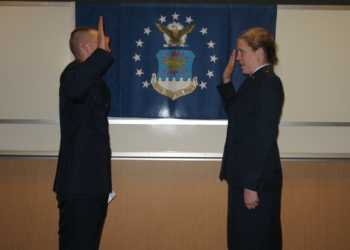Air Force wife Rebekah Young wanted to get a local job while her husband was stationed at Osan Air Base, Korea, but she soon noticed something: U.S. military spouses struggled with finding employment in other nations.
“When you did [find a job], the background checks would take months,” she said. “That’s why I decided to not work and just go to school full-time to finish my degree — which wasn’t a bad thing — but I was frustrated many times about not working.”
Why the holdup? The short answer is SOFA, or Status of Forces Agreement, the legal framework for service members and their families living OCONUS. The longer answer is a web of rumors and misinformation surrounding how SOFA affects military families — especially spouse employment.
Since 1951, SOFA has provided a way for military members and their families to legally reside in more than 100 countries. Each nation has a country-specific agreement with the U.S., meaning that what may be allowable in Japan isn’t in Germany and vice versa.
With that case-by-case nature, it’s easy for half-truths to quickly spread. And because there can be serious consequences for breaking SOFA rules — people can even be sent home early from an assignment — anxiety often surrounds SOFA and jobs while overseas.
Rebecca Shour was told that she and her husband, an airman stationed in Italy, could not even hire an American babysitter. An American could volunteer, people said, but you could not pay them because of SOFA.
“I have heard of people getting in trouble before, and when I was asking around for babysitters, I was specifically warned by several people to reword how I was asking and be careful who I asked,” said Shour. “It just makes everything extra difficult.”

Stories like that greatly frustrate Army wife and SOFA expert Beth Conlin. After her career suffered because of SOFA murkiness while stationed in Germany and Korea, she was determined to learn everything about SOFA.
“I’ve been on a mission to provide clarity on what SOFA actually is, what it means and doesn’t mean for military spouses who want to maintain their careers overseas,” Conlin said. “Ever since 2013, I have dug in at the country, Senate, State Department and DOD levels to understand why we are all just told these things but no one can point to any proof.”
On that note, one of Conlin’s top recommendations is to check the SOFA regulations for yourself whenever anyone says what you can and cannot do at your new assignment.
“We were told in Korea that we couldn’t get our hair done by an American,” she shared, which was false. “The fearmongering is just next-level.”
The bottom line, Conlin said, is that if you’re already employed in the states, SOFA is never the reason you cannot keep your job while stationed abroad. Instead, it’s your employer’s ability to support you or not when you PCS.
“Whatever your employer’s current process is for any employee — not just military spouses — transferring overseas, military spouses should follow that exact process,” she said, noting that she has personally supported a half-dozen employees in keeping their jobs at her current workplace, Amazon, as the employees moved overseas. “And if they’re a small business, there are various ways they can work on implementing remote work for you.”
And even if you want to get a new job overseas, you can still do so. Step one, Conlin said, is to reach out to your installation’s JAG officer at your new assignment for country-specific guidelines. Thankfully, there were exciting advances made in 2023 concerning SOFA in Italy, a European nation with more than 12,000 active-duty American troops.
“Italy just outlined clearly what it means to work in Italy, what type of remote work you can bring over from the U.S. and what type of work you can do in-country,” Conlin said. “Can I sell Pampered Chef? Can I practice law here? It gives all the clarity you need and there is no ambiguity, which is amazing.”
If you’re not PCSing to Italy, take heart. You can still take Italy’s clear guidelines to your new installation and ask how to get the same clarity.
“The military spouse community is pretty creative and resourceful, so it’s pretty odd to me that we let the cloudiness of SOFA be the thing that suddenly dictates so much of our lives,” Conlin said. “It’s why we need to give military families all the information up front, so they can make the right decision for their family — which includes the ability to have a second income.”









































